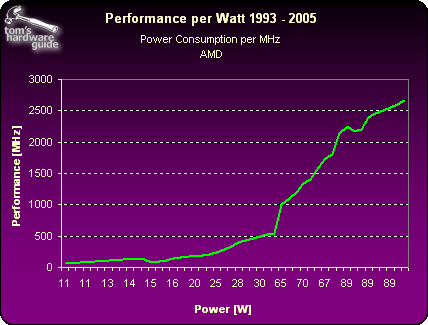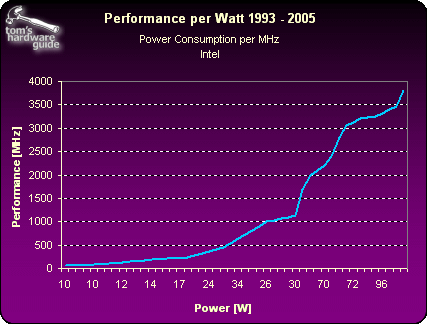The Mother of All CPU Charts 2005/2006
Energy Efficiency By Performance Per Watt

The development of performance per watt of AMD processors from 1993 to today. As you can see, the performance per watt has greatly increased over the years.

The same development of Intel processors, also from 1993 to today. However, the results for current CPUs are not necessarily indicative of higher performance, since their higher clock speed does not always equate to proportionally higher performance. Still, as is the case with AMD processors, the performance per watt has increased tremendously.
What good are higher clock speeds to the end user if the heat dissipation reaches dizzying levels? In times of rising energy costs, a new standard is becoming more of a deciding factor, namely performance per Watt, where Watt is the unit that measures a processor's power consumption.
For a long time, the equation 'clock speed = performance' was an accepted measure of real-world performance or in other words for value. Based on this, the original Pentium 60 got 6 MHz per watt in 1993. By comparison, today's Pentium 4 running at 3.8 GHz is a paragon of efficiency at 33 MHz per watt.
Our diagrams show this development quite clearly. Since 1995, the performance of processors has increased dramatically in relation to their thermal power loss. Nonetheless, notorious naggers continue to deny this fact. AMD's processors are more efficient than Intel's offerings, especially when dual-core processors are concerned. AMD did not need to lower frequencies by much when compared to the single-core versions. Intel, on the other hand, was forced to cap the maximum clock speed of its dual-core processors at 3.2 GHz, and for now, a dual-core version of a Pentium running 3.8 GHz remains impossible.
Again, some critics argue that there are practically no serious and sensible applications for dual-core CPUs. And again, we find it hard to argue with that statement. Sadly, that won't change much either for the foreseeable future, leaving the user in the lurch until the software base becomes thread-optimized.
Stay on the Cutting Edge
Join the experts who read Tom's Hardware for the inside track on enthusiast PC tech news — and have for over 25 years. We'll send breaking news and in-depth reviews of CPUs, GPUs, AI, maker hardware and more straight to your inbox.
Current page: Energy Efficiency By Performance Per Watt
Prev Page Facts & Figures - The Evolution Of Performance Next Page Processor UpdatesTom's Hardware's dedicated news crew consists of both freelancers and staff with decades of experience reporting on the latest developments in CPUs, GPUs, super computing, Raspberry Pis and more.
Most Popular


